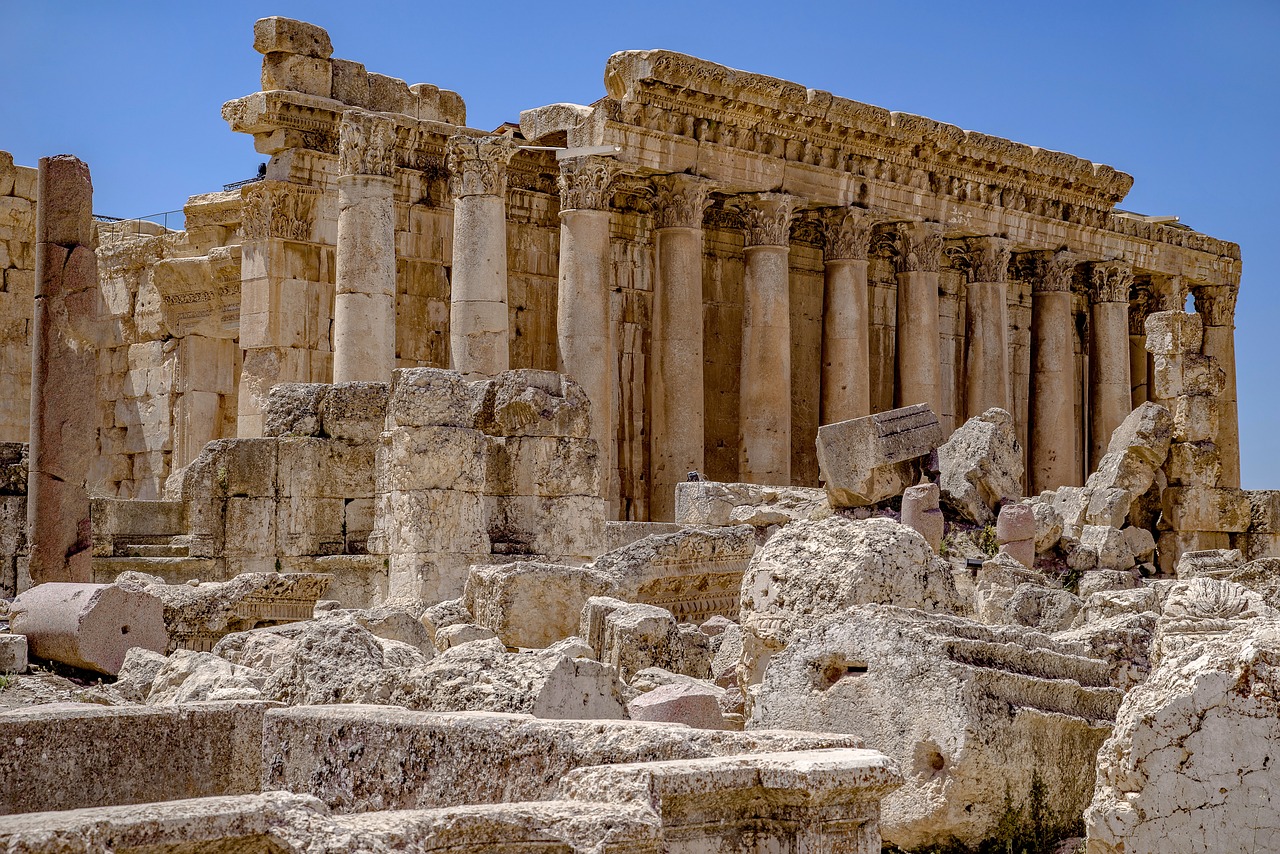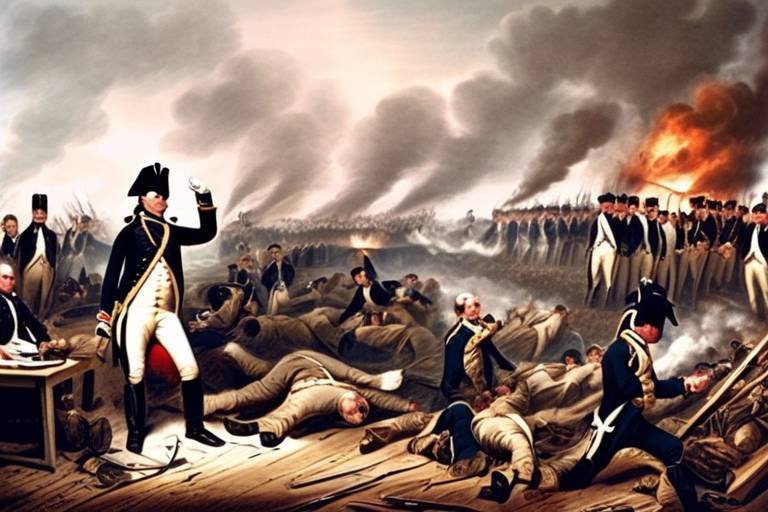The Influence of Ancient Greece on Western Literature
Ancient Greece stands as a cornerstone of Western literature, laying the foundation for the rich tapestry of literary traditions that have flourished throughout the centuries. The influence of ancient Greek literature can be felt in every aspect of Western storytelling, from epic poetry to philosophical dialogues, and from dramatic innovations to rhetorical techniques.
One of the most enduring legacies of ancient Greek literature is the epic poems of Homer, namely the Iliad and the Odyssey. These foundational epics delve into timeless themes of heroism, fate, and the complexities of the human experience, setting a standard for narrative storytelling that continues to captivate audiences to this day.
Furthermore, the dramatic innovations of ancient Greek playwrights like Aeschylus, Sophocles, Euripides, and Aristophanes have shaped Western dramatic traditions. The birth of tragedy and comedy in ancient Greece introduced new forms of storytelling that explored the depths of human emotion and the absurdities of life.
Philosophical dialogues, as exemplified by the works of Socrates recorded by Plato and Xenophon, have had a profound impact on Western intellectual discourse. The Socratic method of questioning and pursuit of knowledge continues to influence ethical debates and philosophical inquiries in modern society.
Ancient Greek lyric poetry, with luminaries such as Sappho and Pindar, showcased the elegance and complexity of verse, shaping the development of poetic forms in Western literature. The beauty of ancient Greek poetry continues to inspire poets and writers around the world.
Additionally, the historical narratives of Herodotus and Thucydides have played a crucial role in shaping Western approaches to recording the past. These early historians laid the groundwork for the genre of historiography, influencing how we understand and interpret history.
The rich tapestry of Greek mythology, filled with gods, heroes, and monsters, has permeated Western literature, providing a wealth of mythological archetypes that continue to resonate in storytelling. The symbolic depth of Greek myths adds layers of meaning to modern narratives.
Moreover, the rhetorical techniques employed by ancient Greek orators like Demosthenes and Isocrates have left a lasting impact on Western discourse and argumentation. The art of persuasion developed in ancient Greece continues to shape how we communicate and persuade others in various fields.
Lastly, the ethical and moral teachings of Epicurus and the Stoics have influenced Western philosophy and literature, shaping personal ethics and values. The principles of Epicureanism and Stoicism offer valuable insights into leading a virtuous and fulfilling life.

Foundational Epics: The Legacy of Homer
The legacy of Homer's foundational epics, the Iliad and the Odyssey, resonates throughout Western literature like a timeless melody that never fades. Homer's masterpieces are not merely ancient tales of heroism and adventure but intricate tapestries woven with threads of human emotion, fate, and the very essence of the human experience. These epics stand as towering pillars, shaping the literary landscape of the Western world with their profound themes and captivating narratives.
Imagine stepping into the world of ancient Greece, where the clash of gods and mortals unfolds in epic battles, where heroes rise and fall against the backdrop of a destiny written in the stars. Homer's epics are not just stories; they are living entities that breathe life into the essence of heroism, portraying the eternal struggle between fate and free will in a way that captivates generations across centuries.
The legacy of Homer's epics extends beyond mere storytelling; it embodies the very essence of what it means to be human. Through the trials and tribulations of characters like Achilles and Odysseus, we glimpse into the depths of our own souls, confronting our fears, desires, and the eternal quest for meaning in a world fraught with challenges and uncertainties.

Dramatic Innovations: The Birth of Tragedy and Comedy
When exploring the dramatic innovations that emerged from ancient Greece, one cannot overlook the pivotal moment that marked the birth of tragedy and comedy. These two distinct theatrical forms, with their roots deeply embedded in Greek culture, have left an indelible mark on Western literature and performance arts.
Tragedy, as introduced by playwrights like Aeschylus, Sophocles, and Euripides, delved into the complexities of human suffering, fate, and the moral dilemmas faced by individuals in the face of adversity. These tragic works often centered around larger-than-life characters, such as Oedipus and Medea, whose actions and decisions reverberated with profound consequences.
On the other hand, comedy, exemplified by the comedic genius of Aristophanes, offered a lighter, satirical take on societal norms, politics, and human follies. Through humor and wit, ancient Greek comedies provided a platform for social commentary and critique, challenging the status quo and inviting introspection.
The birth of tragedy and comedy in ancient Greece not only entertained audiences but also served as a reflection of the cultural, political, and philosophical landscape of the time. These dramatic innovations paved the way for the development of theatrical conventions, character archetypes, and narrative structures that continue to influence contemporary storytelling and performance arts.

Philosophical Dialogues: The Impact of Socratic Thought
Philosophical dialogues were a cornerstone of ancient Greek intellectual discourse, with Socrates emerging as a central figure in shaping philosophical thought. Socrates, as depicted in the dialogues of Plato and Xenophon, engaged in probing conversations that delved into fundamental questions about ethics, morality, and the nature of knowledge. His method of questioning, known as the Socratic method, aimed to stimulate critical thinking and self-examination.
Through these dialogues, Socratic thought laid the groundwork for Western philosophy by emphasizing the importance of self-awareness, rational inquiry, and the pursuit of truth. Socrates' relentless questioning challenged conventional beliefs and encouraged individuals to question their own assumptions, fostering a spirit of intellectual inquiry that continues to influence philosophical discourse today.
One of the key tenets of Socratic philosophy was the concept of the examined life, which posited that true wisdom comes from self-reflection and the constant questioning of one's beliefs and values. This emphasis on introspection and critical thinking remains a central theme in modern philosophical inquiry, underscoring the enduring relevance of Socratic thought.
Furthermore, Socratic dialogues often revolved around ethical dilemmas and moral principles, exploring the nature of justice, virtue, and the good life. By engaging in conversations that challenged prevailing notions of right and wrong, Socrates encouraged individuals to think deeply about the ethical implications of their actions and decisions.
Overall, the impact of Socratic thought on Western intellectual history cannot be overstated. Socrates' emphasis on rational inquiry, moral introspection, and the pursuit of knowledge has left an indelible mark on philosophy, ethics, and the broader intellectual tradition, shaping the way we think about fundamental questions of existence and the human experience.

Lyrical Poetry: The Elegance of Ancient Greek Verse
When it comes to the realm of ancient Greek literature, one cannot overlook the sheer elegance and beauty of lyrical poetry that emerged from this rich cultural tapestry. The lyrical poetry of ancient Greece holds a special place in the evolution of Western verse, showcasing a level of sophistication and artistry that continues to inspire poets and readers alike.
One of the most renowned figures in ancient Greek lyric poetry is Sappho, whose works are celebrated for their emotional depth and vivid imagery. Sappho's verses often explore themes of love, desire, and the complexities of human emotions, capturing the essence of the human experience with unparalleled grace.
In addition to Sappho, the poet Pindar is also revered for his contributions to ancient Greek verse. Pindar's odes, known for their intricate structure and elaborate language, exemplify the grandeur and majesty of ancient Greek lyric poetry, elevating the art form to new heights of expression and creativity.
A key aspect of ancient Greek lyric poetry is the use of poetic forms such as the ode, the elegy, and the hymn, each serving as a unique vehicle for poetic expression and storytelling. These forms not only influenced the development of Western poetry but also laid the groundwork for future generations of poets to explore and innovate within the realm of lyrical verse.
Furthermore, the elegance of ancient Greek verse extends beyond the individual works of poets like Sappho and Pindar, permeating the broader landscape of Western literary traditions. The lyrical poetry of ancient Greece continues to serve as a source of inspiration and admiration for poets and scholars seeking to delve into the beauty and complexity of poetic language.
Q: How did ancient Greek lyric poetry influence Western literature?
A: Ancient Greek lyric poetry, with its emphasis on emotional depth, vivid imagery, and intricate poetic forms, laid the foundation for the development of Western verse and inspired generations of poets to explore themes of love, desire, and human experience.
Q: Who were some of the notable ancient Greek lyric poets?
A: Sappho and Pindar are among the most celebrated ancient Greek lyric poets, known for their exceptional talent in capturing the essence of human emotions and experiences through their lyrical verses.
Q: What poetic forms were commonly used in ancient Greek lyric poetry?
A: Poetic forms such as the ode, the elegy, and the hymn were frequently employed by ancient Greek lyric poets to convey their thoughts, emotions, and narratives in a structured and expressive manner.
Q: How has the elegance of ancient Greek verse influenced modern poetry?
A: The elegance and beauty of ancient Greek verse have had a lasting impact on modern poetry, inspiring poets to experiment with language, form, and themes in their own works, while paying homage to the rich tradition of lyrical poetry that originated in ancient Greece.

Historical Narratives: Herodotus and Thucydides
When delving into the realm of historical narratives, the names of Herodotus and Thucydides stand out as luminaries in the field of historiography. Herodotus, often hailed as the "Father of History," was a Greek historian known for his monumental work, "The Histories." This magnum opus chronicled the Greco-Persian Wars and provided a detailed account of the ancient world, blending historical facts with folklore and cultural anecdotes.
On the other hand, Thucydides, a contemporary of Herodotus, offered a more analytical and critical approach to historical writing. His seminal work, "History of the Peloponnesian War," focused on the conflict between Athens and Sparta, showcasing a meticulous attention to detail and a profound understanding of political and military strategies.
Herodotus and Thucydides laid the foundation for the genre of historical writing, setting standards for accuracy, impartiality, and narrative structure that continue to influence historians to this day. Their works not only documented past events but also sought to analyze the underlying causes and consequences of historical developments, shaping the way we perceive and interpret history.

Mythological Archetypes: Gods, Heroes, and Monsters
Delve into the enchanting world of Greek mythology, where gods reign supreme, heroes embark on epic quests, and monstrous creatures roam the lands. These mythological archetypes have woven themselves into the fabric of Western literature, leaving an indelible mark on storytelling for centuries to come.
The gods of Mount Olympus, with their divine powers and intricate family dynamics, serve as timeless symbols of human desires, flaws, and aspirations. From Zeus, the thunder-wielding king of the gods, to Athena, the wise goddess of wisdom and warfare, each deity embodies different facets of the human experience, offering both guidance and challenges to mortal heroes.
Heroes like Achilles, known for his invincibility save for his heel, and Odysseus, the cunning strategist on a perilous journey home, exemplify courage, resilience, and the complexities of heroism. Their adventures, filled with triumphs and tragedies, resonate with audiences across cultures and generations, inspiring countless retellings and adaptations.
Monsters such as the fearsome Hydra, the cunning Sphinx, and the seductive Sirens populate the mythological landscape, embodying primal fears and desires. These creatures challenge heroes to confront their inner demons, test their strengths and weaknesses, and ultimately prove their worthiness through courage and cunning.
Through the lens of mythological archetypes, ancient Greek storytellers explored universal themes of love, betrayal, power, and destiny, offering insights into the human condition that continue to captivate readers and audiences today. The enduring appeal of gods, heroes, and monsters in Western literature speaks to the timeless nature of these archetypes and their ability to transcend cultural boundaries.

Rhetorical Techniques: The Art of Persuasion in Ancient Greece
Ancient Greece was not only a cradle of civilization but also a hub of intellectual and rhetorical prowess. The art of persuasion, deeply ingrained in Greek culture, found its zenith in the rhetorical techniques employed by influential orators like Demosthenes and Isocrates. These skilled speakers mastered the art of swaying audiences through eloquent speeches, clever arguments, and captivating delivery.
Central to the art of persuasion in Ancient Greece was the use of ethos, pathos, and logos - the three pillars of effective rhetoric. Orators strategically appealed to the audience's ethics, emotions, and logic to craft compelling arguments that could convince and influence even the most skeptical listeners. By balancing these elements, speakers could establish credibility, evoke empathy, and present reasoned arguments to win over their audience.
Moreover, rhetorical techniques such as repetition, parallelism, and rhetorical questions were employed to enhance the persuasive power of speeches. The rhythmic cadence of repeated phrases, the symmetrical structure of parallel clauses, and the thought-provoking nature of rhetorical questions all served to engage listeners, emphasize key points, and drive home the orator's message.
Furthermore, the use of vivid imagery, vivid metaphors, and powerful analogies enriched the orators' speeches, making complex ideas more accessible and memorable to the audience. By painting vivid pictures with words and drawing parallels to familiar concepts, speakers could effectively communicate their ideas and leave a lasting impact on their listeners.
In essence, the art of persuasion in Ancient Greece was a sophisticated and nuanced practice that combined linguistic skill, emotional intelligence, and strategic thinking. By mastering rhetorical techniques and harnessing the power of persuasive language, Greek orators shaped public opinion, influenced political decisions, and left a lasting legacy that continues to inspire and inform modern discourse.

Epicurean and Stoic Philosophies: The Influence on Moral and Ethical Thought
The Epicurean and Stoic philosophies emerged as influential schools of thought in ancient Greece, shaping moral and ethical perspectives that continue to resonate in Western philosophy and literature. Epicurus, the founder of Epicureanism, emphasized the pursuit of pleasure and the avoidance of pain as the highest good in life. Contrary to popular misconceptions, Epicurean philosophy focused not on hedonistic indulgence but on achieving tranquility through moderation and simple pleasures. Stoicism, on the other hand, founded by Zeno of Citium, promoted the cultivation of virtue, resilience in the face of adversity, and acceptance of fate as essential components of a virtuous life.
These philosophical traditions profoundly influenced subsequent thinkers and writers, including Roman philosophers like Seneca, Epictetus, and Marcus Aurelius, who further developed and popularized Stoic principles. The Stoic emphasis on self-control, rationality, and the acceptance of external events beyond one's control resonated with individuals seeking inner peace and moral guidance in turbulent times.
Moreover, the Epicurean focus on seeking pleasure in moderation and cultivating friendships based on mutual respect and intellectual stimulation offered a counterbalance to the Stoic emphasis on self-discipline and resilience. Both philosophies addressed fundamental questions about the nature of happiness, the role of virtue in ethical decision-making, and the pursuit of a meaningful life.
Frequently Asked Questions
- What is the significance of ancient Greek literature in Western literary traditions?
Ancient Greek literature holds immense significance in Western literary traditions as it laid the foundation for various genres and themes that continue to influence modern works. From epic poetry to dramatic innovations and philosophical dialogues, the impact of ancient Greek literature is profound and enduring.
- How did Homer's epic poems, the Iliad and the Odyssey, contribute to Western literature?
Homer's epic poems, the Iliad and the Odyssey, are considered foundational works in Western literature due to their exploration of themes such as heroism, fate, and the human experience. These epics set a standard for storytelling and character development that has inspired countless writers throughout history.
- What role did Greek tragedy and comedy play in the development of Western dramatic traditions?
Greek tragedy and comedy, pioneered by playwrights like Aeschylus, Sophocles, Euripides, and Aristophanes, introduced new forms of storytelling and theatrical expression that continue to shape Western dramatic traditions. These genres explored complex human emotions and societal issues in a way that resonates with audiences to this day.
- How did Socratic thought influence Western intellectual discourse and ethics?
The philosophical dialogues of Socrates, as recorded by Plato and Xenophon, had a profound impact on Western intellectual discourse by encouraging critical thinking, ethical reflection, and the pursuit of knowledge. Socratic thought continues to shape ethical debates and philosophical inquiries in contemporary society.



















